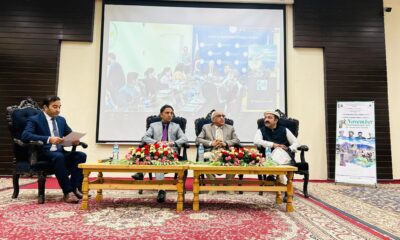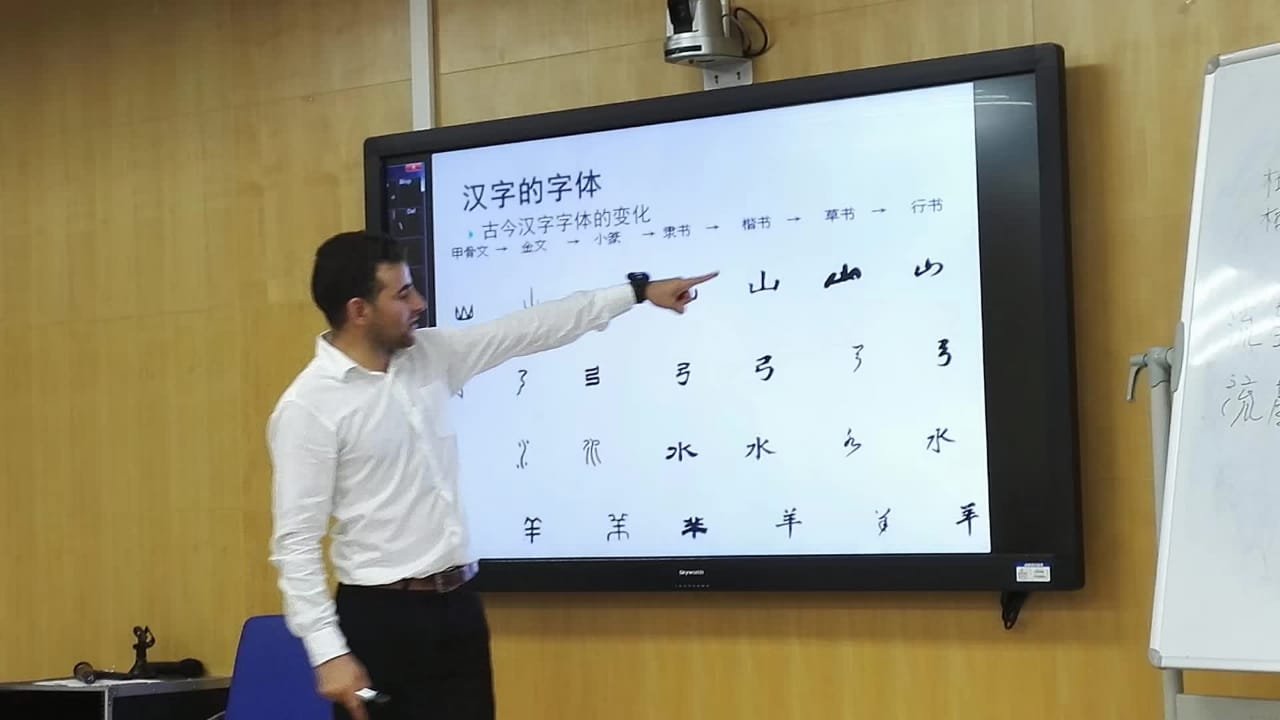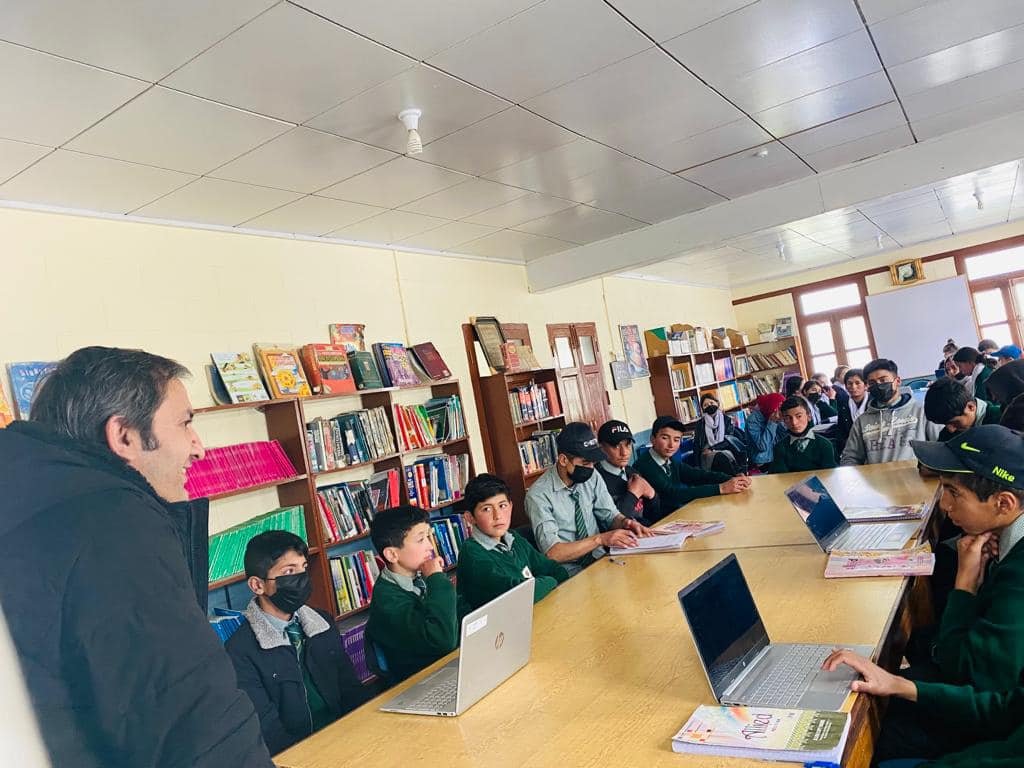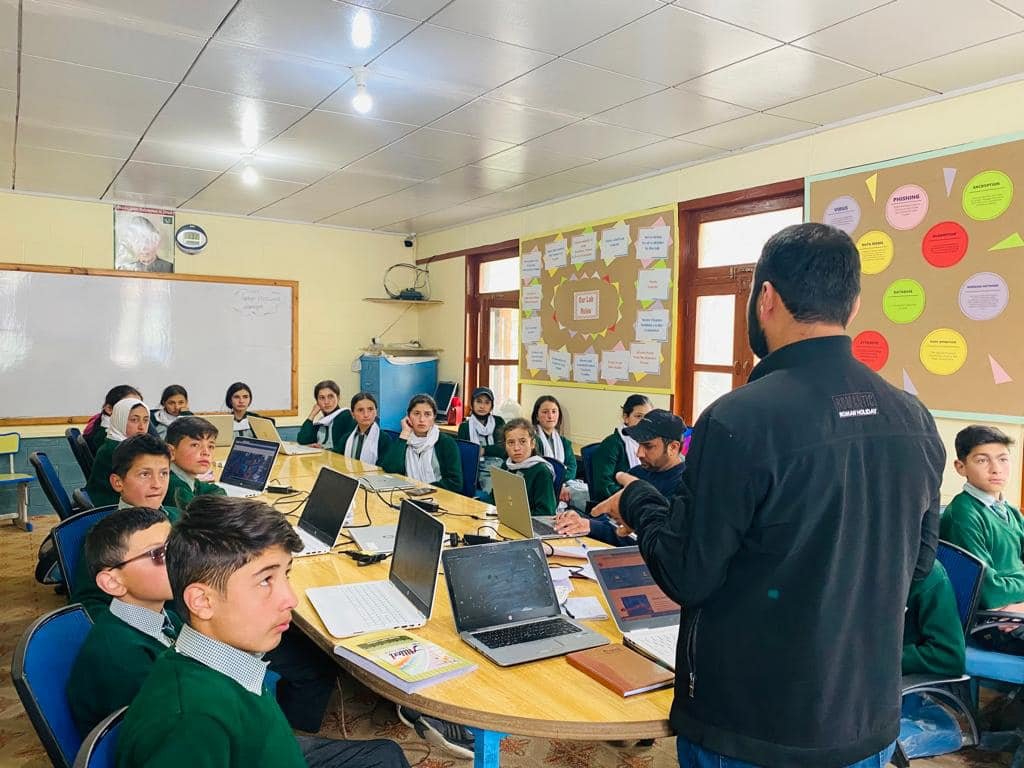Education
An Exclusive Interview with the Vice-Chancellor
Published
2 years agoon

Karakoram International University, Gilgit
Prof. Dr. Engr. Attaullah Shah
“In the next four years, we will focus on financial sustainability by diversifying the revenue base, internationalizing KIU, strengthening the quality of academic research and services, and strengthening our partnership with the best national and international institutes of high repute.”
The Vice-Chancellor speaks to The Karakoram about the major challenges and achievements of his first tenure as Vice-Chancellor and his vision for the future of the Karakoram International University.

___________________________ Interviewer: Esma Ramzan
The Karakoram: Heartiest congratulations on your extension. This must obviously be giving a feeling of accomplishment and satisfaction that the incessant day and night efforts have been acknowledged and confided in for one more tenure. To whom should the credit go?

VC: First of all, I am highly grateful to Allah SWT, Who is the Most Merciful and the Beneficent, for His countless blessings. The first time I was an applicant and came here by competing with other candidates, whereas, my second tenure endured because of the trust of everyone in society. Persistence and consistency are very important for the excellence of any institution, and to maintain stability, all the stakeholders, starting from the Gilgit-Baltistan government, the military leadership, the President’s house, and the HEC, collectively supported this extension. That is because of the collective efforts and hard work of my team.
The Karakoram: Please enlighten us about the major challenges and achievements of the first tenure in the light of the vision of the varsity and the way forward for this term of your august leadership.
VC: My team knows that soon after I joined, we had some challenging situations. The first challenge was related to the KIU board. Public schools and colleges were advised and directed to disaffiliate from the KIU board and go to the federal board, which caused a total loss of 100 million so far. People usually say that; you are earning from the educational board, which is not the responsibility of the university. My vision is very different. The money we were deriving from the board activities was used for subsidizing student fees. That was the first blow we had.
The second challenge was the PM Fee reimbursement scheme, which was discontinued in 2018, and affected the education of almost 880 students at that time. I am grateful that the GB Govt. bailed us out partially by giving us 40 million. Collectively, we tried to solve this problem through a 2-year master’s program. KIU waived 20 million to such students, whereas 20 million paid by students for the semester was adjusted.
The third challenge was the shortage of space, as an increase in enrolments from 4200 to 8000 students required facilities like buildings, furniture, and labs. Another challenge was about the image of KIU. It was not very good in the HEC, in the PEC, and even in the society due to some misperceptions created by fake letters from both inside and outside. A climate of distrust was prevailing in general. The only reason I could figure out was our lack of coordination and weak relationship with the community, stakeholders, donors, and GB Govt. I tried to bridge this gap and worked with the media and stakeholders on image building.
Apart from these, the financial challenge was one of the biggest in the last four years. The government increased 10% to 15% salaries every year in the last two years, with two DRA’s and one increase, which collectively brought us a deficit of 150 million. The government gave us only a 10% increase in allocations.
Alhamdulillah, we are trying to develop our capacity to compete with these challenges. Moreover, I am working with the GB government to give us a special grant of 100 million on an annual basis. Chief Minister Gilgit-Baltistan Respectable Khalid Khurshid Khan has already announced a 100 million grant to KIU and approval of a building for media and arts faculty in ADP. He has also assured special grants for the construction of female students’ hostels, etc. We hope that, with the support of provincial and federal governments, we will be able to respond to these challenges.

The Karakoram: There was an obvious feeling that in the dire financial crisis the universities around the country faced in the onslaught of COVID 19, when many universities faced a lack of leadership, you not only steered KIU through that but also accepted the same tough journey once again. Where does mustering up such courage come from?
VC: COVID 19 was an unprecedented catastrophe for humanity. Gilgit‐Baltistan (GB) is a mountainous region of Pakistan, which has been significantly influenced by the coronavirus diseases. This region has already been highly vulnerable to climate change and environmental degradation, and the outbreak of the COVID-19 pandemic has further exacerbated these old risks with the indication of new ones. The aftereffects of this pandemic were likely to be severe not only in socio-economic spheres but also in the educational domain. We tried our best to cope with that uncertain situation. In March 2020, we started the “Learning Management System” (LMS) and introduced an online portal for the continuity of education. Apart from this, we provided a 15 to 20% COVID subsidy to the students. Side by side, we engaged with the Federal Govt. for the maximum number of scholarships and got almost 4,000 scholarships for the students. We managed to manage unprecedented scholarships for our students in this time of high distress.
The Karakoram: Along with its difficulties, the lockdown also brought new opportunities to learn. It was during the lockdown that KIU digitized its educational system and continued the process in a non-conventional way. Now that things are back to normal, what will be the future of this digitization? Given the difficulties of the region, do you think KIU will be able to sustain it? Are we going to revert to pre-COVID practices? Or are we to find a middle way between the conventional and non-conventional way?
VC: One lesson the world has learned from COVID-19 is that virtualization and digitization are very important not only in education but in business too. The LMS will augment traditional methods of working. We are not going to stop it; rather, we are making it more rigorous for the faculty and staff to adopt it. During the pandemic, more than 5000 students were educated online, whereas 40 distance learning centers were established across all districts of GB to reach those students where networks were not available. To provide access to remote areas to higher education, we have established a directorate of distance and open/blended learning and also offered some certificate courses. The first one is “Academic Leadership.” The second is “Project Management,” and the third one is “Organizational Behavior and Development.” Furthermore, we plan to launch an online B. Ed program for school teachers at the main campus and sub-campuses of Hunza Ghizer and Chilas on weekends next year, allowing those teachers who work to continue their education. Apart from learning and teaching, we are also digitizing other processes. For example; we are working with the COMSATS data center on five modules; Finance, HR, Transport, Inventory, and Procurement. These five modules would be part of the “Management Information System” (MIS). My vision is that by the next four years, we shouldn’t have a single hard copy in our hands. I believe that we are ready for any unpredictable challenges in the future, and KIU has to become a paperless university.
The Karakoram: Development of research facilities has been on your list since day one, and We have seen your tireless efforts to achieve this vision of yours, through your various initiatives to promote research culture in University, of course. What are your aspirations to enhance KIU’s research facility?
VC: I believe that if we remove research from a university, the university will become a community college or a mere degree college. The first research initiative after I joined was the “Graduate School”. KIU graduate school focuses on people who are already in a job and prefer to offer programs on weekends. Initially, we started with 6 to 7 programs; now we have more than 21 programs, including 17 MS and 6 Ph.D. programs. Moreover, we established the “China Study Centre” that focused more on CPEC-related research and strengthening people-to-people connectivity. We tried to bring very competent consultancy teams to engage with the GB Govt. the UNDP, the Research Pakistan Science Foundation, and the High Education Commission to see how research can be more focused on the issues of the region. Apart from this, in the last four years, we have fetched some big research projects from the NPPU, TDF, CPEC, British Academy, PSF, and the World Wild Life Fund. Currently, we have around 700 students in the KIU Graduate School and 120 Ph.D. faculty members, which is unique in this part of the world.

The Karakoram: What role would KIU be playing in the region’s development with regards to CPEC? Will the game-changer plan change things for the institute as well?
VC: Whenever I talk about CPEC, I talk about three corridors; “Economic Corridor,” “Knowledge and Research Corridor,” and “Technology Corridor.” Integration of these three corridors can change the entire landscape of the world. If we incorporate all these corridors, CPEC would be a game-changer for KIU. The credit goes to the previous Vice-Chancellor, Dr. Asif Khan, who initiated the CPEC Research Centre. It proved to be a base for the China Study Centre. There are three major objectives of CSC; how the connectivity among people would be strengthened, how the knowledge and research would be flourished, and how the trade and commerce connectivity would be reinforced. Recently, we got funding of 5.6 million from the Chinese Ambassador, His Excellency Nong Rong. He has committed another grant of 6 million for the students of KIU.

The Karakoram: One last and an exclusive question, which is rather a criticism to some extent as well, is that people normally think this university is so-called an international university on paper. Where do you see this university in ten to fifteen years from now, and what may be the possible steps that need to be taken to turn it into a truly globally recognized international university?
VC: In the early years of this university, we didn’t have the proper facilities. The faculty was too young. Most of them were non-Ph.D. in the beginning, so we couldn’t impress the foreign students. Furthermore, there were many law and order challenges. We fought the war against terror. Such circumstances created the kind of environment in which the internationalisation of the KIU was not possible. We established the International Relations office initially; Dr. Tassawur was heading it; now Dr. Sajjad is leading it. We are focusing on 4 to 5 areas of internationalization; the first is the exchange of faculty through online teaching with the international faculty. We can also introduce a student exchange program for one semester. In this regard, we are working with the Chinese Academy of Sciences, the University of Central Asia, and other universities in the region. Once the COVID-related constraints are relaxed, we will start such exchange programs.
Moreover, we are also planning to offer dual degree programs with our Chinese counterparts. For this purpose, we are collaborating with the Northern China University of Science and Technology. Our target is to offer a Mining Engineering 3+1-degree program. Students will complete 3 academic years at KIU Pakistan and 1 academic year in China. The degree will be issued by both universities. In the next few years, you will see that the real international flavor of the university will come.
In the end, I want to say that all of us must be proud to be a part of the KIU family. This university is unique not only in Pakistan but in the entire world. Whatever Allah has given to us is much more than we deserve. We should be submissive and thankful for every blessing. In the next four years, we will focus on financial sustainability by diversifying the revenue base, internationalizing KIU, strengthening the quality of academic research and services, and strengthening our partnership with the best national and international institutes of high repute. I would advise all KIU families to be united and committed to achieving these common goals of excellence.
About Author
The Karakoram Magazine
The Karakoram Magazine seeks high-quality, unpublished,nonfiction, first person articles relevant to Gilgit-Baltistan and topics as varied as Geo Strategic & Economic Significance of GB, Arts & Literature, Tourism & Hospitality, Culture and heritage, Education and technology, Health & Wellbeing, Climate Change and Wildlife, Economic & Trade, Sports & Recreations, Youth & Women empowerment and Achievements of Illustrious People of GB in different fields etc.
You may like
-


Rumi, the Moral Psychologist
-


Poor Winter Maintenance of KKH Risks CPEC All-Weather Trade
-


Pakistan Army Launches Rescue Operation, Missing Passengers in Deosai Found Safe
-


PM Shehbaz Sharif Visits Gilgit-Baltistan, Honors Martyrs, and Launches Development Projects
-


CISS-KIU Seminar: A Tribute to Gilgit-Baltistan’s Freedom Fighters of 1947
-


Gilgit-Baltistan Marks 77th Liberation Day from Dogra Rule
Education
The Learning Deficit: Unmasking the Failings of Education and Overcoming the Obstacles.
Published
2 years agoon
July 13, 2023By
Zia Uddin
Spectacularly, the education system, which most of us will not be shocked to get to know, refers to the coordination of individuals — among teachers, — administrators, and students. Above all, it demands infrastructure — including safe facilities and transportation, to be functioning institutions and systematic processes.
Similarly, the system of education, radically, is linked to the transmission of knowledge, which allows the socialization of people.
In addition, I would go along the chasmic view that the education sector, prominently, is supposed to provide superior human resources to all areas of national life. It builds, — stabilizes, — and keeps the nation on the move, and among citizens, probably, enhances a sense of civility, patriotism, and super good understanding.
To get notched educational goals up, curriculum plays a vital role as a pillar does in the building.
But. Ruefully, for us, an effective system of education has always been a wish to be fulfilled. That is to say, we, for the good, have gotten ourselves stuck in a fallacious and tedious chain of the education system. Imagine, being attached to the — syllabus — which — almost— erroneously brings us approximately two decades back. For sure, our syllabus is expired and we can’t even think of competing with the current epoch of education with the quality we have.
Likewise, Pakistan, more often than not, lacks the most identified tactics to adopt technologies in curriculum, but conversely, in foreign countries, strategies are made in such a way that curriculum changes with the updation of technologies. As aforementioned, in Western countries, the education system is student-oriented, enhancing superior qualities like critical thinking, problem-solving skills, and formulating new ideas, above all, having the concept “Study to Understand, not memorize” weighs students’ motivation.
But, on the other hand, in our country ” Teacher” holds the remote, He controls, His opinions are undeniable and we are merely supposed to memorize selected numbers and facts. Isn’t it too uncanny?
Although, to overcome these hindrances, I have jotted the potential solutions down here:
1. Curriculum amendment:
In this competitive market environment, curriculum amendment must be taken into account regularly, so that the need for updated courses can be ensured and the incorporation of modern teaching methodologies, problem-solving skills, and critical thinking, similarly, enhance the learning experience for students for the good.
2. Quality Improvement:
If it comes to quality of education, the most primitive and prominent factors like the availability of learning resources, such as technology, laboratory, and updated textbooks should be the priority of the government and there should be professional development opportunities for teachers so that services by them can be rendered in most effective and required way to retain the quality education in rapidly changing environment.
3. Community Engagement:
To overcome educational barriers, local communities, and civil society should be involved in contributing their relentless efforts, and gatherings like,
Awareness campaigns, and parent-teacher associations, can promote the value of education and create a supportive environment for learning as well.
4. Increased Investment:
Education improvement, no doubt, demands a high rate of investment, so the national budget, therefore, should be allocated in such a that it can minimize infrastructure deficiencies and improve the quality of learning resources.
5. Enhancing Access and Enrollment:
There should be a proper path to implement the strategic perceptive of learning and to promote easy access to education by getting infrastructure done, especially for remote areas, which is essential.
6. Public-private partnerships:
It is obvious that allocation of resources, identification of expertise, and adoption of innovative tactics, are only possible if there is an existence of collaboration between the public and private sectors. Moreover, public-private partnerships can assist bridge gaps in technical access, fundraising, and most identified programs.
The above-mentioned solutions demand a closer scrutiny, commitments, and long-term planning. By analyzing these key solutions, Pakistan can get rid of educational dilemmas and can easily get access to a high-quality education system that in turn, will prepare its citizens to survive in this dog-eat-dog epoch and to embrace challenges in the days to come.
About Author
Zia Uddin
The writer is a student of Business Management at Karakoram International University, Gilgit.
Education
Chinese Language and its Significance in the Modern Era
Published
2 years agoon
May 15, 2023By
Ajaz ul Haq
Chinese language
Charlemagne, Holy Roman emperor, said, “To have a second language is to have a second soul”. So, I’ll be speaking to you using language … because I can. This is one these magical abilities that we humans have. We can transmit really complicated thoughts to one another.
Now of course, there isn’t just one language in the world, there are about seven thousand languages spoken around the world. And all the languages differ from one another in all kinds of ways. Some languages have different sounds, they have different vocabularies, and they also have different structures.
Over 7000 languages are spoken across the world today. Chinese, the language with the most native speakers, has 13 variations, whilst similarly; this reflecting the importance and the wide range of countries and cultures it is spoken. Chinese stands out as the most spoken language in the world with over an estimated more than 1.3 billion people in China and various other parts of the world speaking it. One can easily assume this makes Chinese one of the most important languages on the planet. China as a country is growing by leaps and bounds as a world greatest economic and military power.
Recent studies have shown that Chinese has become a popular choice for a second language among college students. Surpassing the previous favorite that includes Spanish, French, and German languages. This increasing popularity isn’t surprising since the growing appeal of Chinese culture in the west and worldwide.
Governments in the US and the UK are increasingly recognizing the importance of offering Chinese language classes in the school systems. One 2008 poll of employers in the UK, done by the Confederation of British Industry, discovered that 38% of employers answering the poll wanted to hire people who spoke either Mandarin or Cantonese. (The two were lumped together in the survey.) French speakers and German speakers ranked higher, at 52% and 43% respectively. Spanish was desired by 28% of employers.
The UK Schools Secretary said, in part as a result of this survey, that he would like every teenager to have a chance to learn Mandarin. He would also like to see Japanese, Arabic, Portuguese, and Indonesian offered more widely than they are at present. One secondary school in seven in the UK is already teaching Mandarin.
Now, more and more non-Asian parents see learning Chinese as a useful tool for their children, one that will help them compete for top jobs. The US government also sees the benefits of a good pool of Chinese speakers. Some of the school districts in the internationally-minded suburbs of Washington, DC, have offered Mandarin for decades.
Countries with a Chinese speaking population or Chinese as a widely spoken language
- Chinese Speaking Countries in Asia
- China Hong Kong Macau
- Tibet (Tibet Autonomous Region within PR China)
- Singapore
- Taiwan (Republic of China)
Countries with a significant number of Chinese speaking populations (more than 5 million)
- Indonesia (Java and Bali)
- Malaysia (Peninsular)
- Thailand
Mandarin is an official spoken language in China, Taiwan, and Singapore. Cantonese is an official spoken language in Hong Kong and Macau.
Since the invention of the Chinese Pinyin tonal system has made learning Chinese a lot easier than it was previously. The importance of Chinese Pinyin is a crucial method when it comes to writing Chinese in a romanized alphabet. Hanyu pinyin spells the sound and includes tone marks to help give you the proper pronunciation. Knowledge of the written language opens up the culture of one of the world’s oldest civilizations.
Before China’s reform in the 1970s, China was an isolated country that didn’t accept any tourism. After 1970, China has become one of the leading tourist destinations. The Great Wall of China might be one of the most traveled to places on Earth but other wonders of China include the Forbidden City in Beijing, the Terracotta Army in the Qin Empire Emperor Mausoleum, the Yangtze River, and the Potala Palace. Even if you’re just a casual traveler, learning some Chinese to understand street signs, order food, or just communicating with people you meet on the street, a most pleasant and enjoyable experience.
Significance of Chinese Language for Pakistani Students
The Chinese language is becoming increasingly important for Pakistani students due to various reasons such as the growing economic ties between Pakistan and China, the increasing number of Chinese companies investing in Pakistan, and the Chinese government’s efforts to promote its language and culture around the world. Learning Chinese can provide Pakistani students with numerous benefits such as:
Friendship: Learning Chinese can help Pakistani students to build stronger relationships with the Chinese people and develop a deeper understanding of Chinese culture and monetary system.
Jobs: With the increasing presence of Chinese companies in Pakistan, knowing Chinese language can make Pakistani students more competitive in the job market. In addition, many Chinese companies operating in Pakistan prefer employees who can speak Chinese fluently.
Scholarships: The Chinese government offers a large number of scholarships to Pakistani students each year to study in China. These scholarships are primarily aimed at students who are interested in studying the Chinese language, culture, and other academic fields. Knowing Mandarin can increase the chances of Pakistani students obtaining these scholarships.
Economic Opportunities: China is the world’s second-largest economy and a major trading partner of Pakistan. Therefore, proficiency in the Chinese language can open up job opportunities for Pakistani students in various sectors such as trade, finance, and tourism.
Cultural Exchange: Learning Chinese will enable Pakistani students to better understand and appreciate the Chinese culture. This can lead to better cultural exchange, cooperation, and understanding between Pakistan and China.
Academic Opportunities: Chinese is one of the most widely spoken languages in the world, and China is home to some of the best universities in the world. Therefore, learning Chinese can provide opportunities for Pakistani students to study in China and pursue higher education in various fields.
International Relations: Pakistan and China have a close relationship, and knowing the Chinese language can help Pakistani students to communicate and engage with Chinese officials, businessmen, and tourists. This can further strengthen the bilateral relations between the two countries.
Future Prospects: China is rapidly growing as a global superpower, and proficiency in Chinese can provide a competitive edge for Pakistani students in the job market. As China continues to expand its influence, Pakistani students with Chinese language skills will be in high demand.
Institutions offering Chinese language in Pakistan:
Confucius Institutes: Confucius Institutes are educational institutions affiliated with the Chinese Ministry of Education that promote Chinese language and culture around the world. Currently, there are five Confucius Institutes and two Confucius Classrooms across Pakistan, located in Islamabad, Faisalabad Lahore, Karachi, and Punjab.
According to the Pakistani think-tank Pakistan-China Institute, between 26,000 and 30,000 students are studying the Chinese language at various levels in Pakistan.
National University of Modern Languages (NUML): NUML is a public research university in Islamabad that offers courses in various languages, including Chinese.
Allama Iqbal Open University (AIOU): AIOU is a public research university in Islamabad that offers a Chinese language course as part of its curriculum.
Punjab University: The Department of Chinese Language and Culture at Punjab University in Lahore offers courses in Chinese language and culture.
Islamabad Chinese Language Institute: The Islamabad Chinese Language Institute is a private language institute in Islamabad that offers Chinese language courses at various levels.

China Study Centers: The Higher Education Commission (HEC) of Pakistan has established six China Study Centers in different universities across the country, including the China Study Center at Karakoram International University in Gilgit-Baltistan. These centers aim to promote research, academic exchanges, and the learning of the Chinese language and culture in Pakistan. They also aim to enhance cooperation and understanding between Pakistan and China in various fields, including economics, trade, and politics. More than 300 students till the date have completed basic Chinese language under China Study Center Karakoram International University. It’s worth mentioning here that, the Karakoram International University has required students to learn one semester of Chinese language as part of their degree program. It appears that Chinese is the designated language for all departments to teach to their BS degree students. Learning a foreign language can be a valuable skill for students, as it can improve their cultural understanding and communication abilities in a globalized world.
Overall, learning Chinese can be beneficial for Pakistani students in terms of enhancing their personal, academic, and professional growth, and there are several institutions in Pakistan that offer Chinese language courses to facilitate this process.
Chinese is becoming one of the most important languages when it comes to operating an international business.
The Chinese market is the biggest growing market even in this economic downturn. Expertise in Chinese has grown increasingly important to the overall global economy and many business owners are looking to break into this international market. Any business in the twenty-first century will be trying to do business in China and in doing so will be required Chinese speakers to negotiate agreements and develop these trade deals. Economist predicts by 2020, China will without a doubt surpass the United States as the biggest international superpower.
The importance of Chinese is beneficial regardless if you do it for fun or for your career or even just for personal travel. When trying to uncover the importance of Chinese. One cannot discover a more fascinating and challenging language to learn.
All languages evolve with time and Chinese is no exception. To indisputably understand the importance of Chinese language you have to learn the actual language yourself to help you receive the full benefit of this amazing language later. In fact, the latest research has shown that learning a second language helps fight against Alzheimer’s disease and slows down the aging effects of the brain.
Talk about the Importance of language in action!
Why Learn Chinese – Ten Reasons to Learn Chinese
You probably already have your own reasons to learn Chinese but in case you don’t have one already or still looking for more reasons to get motivated to learn Chinese.
This article should help you answer the question “Why learn Chinese?”
1 – Mandarin Chinese is the Most Spoken Language in the World
One of the biggest reasons to learn Chinese should because Mandarin Chinese is spoken by roughly a quarter of the world’s population which is estimated to be around two billion Chinese-speakers. Not all of them live in mainland China, but in parts of Taiwan, Singapore, and throughout southeast Asia.
2 – Chinese Influence on International Cultures
Second, traditional Chinese culture, from Confucianism and Chan Buddhism to martial arts and Chinese cuisine, has an enormous influence on East and Southeast Asian nations. Chinese culture has also greatly inspired the western world through Marco Polo, G. W. Leibniz, Max Weber, Franz Kafka, Andre Malraux, Bertolt Brecht, Ezra Pound, and Luis Borges, among others.
3 – Traveling to China is Increasingly Foreigner Friendly
In the past, China wasn’t very accessible from outside visitors wanted to travel there. But travel to China recently as become a lot easier back and forth from.
4 – With Chinese Pinyin Learning Chinese is Easier
You don’t have to learn Chinese characters to learn how to speak Mandarin Chinese. Pinyin is a method of writing Chinese in the romanized alphabet. Hanyu pinyin spells the sound and includes tone marks to help give you the proper pronunciation.
5 – Fastest Growing Economy in the World
China is currently the fastest growing economy in the world and is already the biggest global market to break into. Any business in the twenty-first century will be trying to do business in China and in doing so will require Chinese speakers to negotiate agreements and trade deals.
6 – Reading Chinese Literature
The dialects are not mutually intelligible but the written language is shared between them all. Although you do not need to learn to read Chinese characters to speak the language, by doing so you open the door to an enormously diverse and rich literature. In fact, the earliest record of writing was in Chinese characters although very different in form from modern characters (of which there are many thousand).
7 – Growing Presence of Chinese Speakers all around the world
Communities of Chinese Speakers have been popping up outside Chinese in parts of the United States and Europe.
8 – Learn Chinese as a Hobby/Love of Learning Languages
Maybe you are just one of those people that just enjoy learning languages for the fun of it! Once you’ve mastered the urge to learn more becomes pretty strong. Contrary to popular opinion, not much confusion happens between languages.
9 – Rich Cultural History of Chinese on the World
Learning Chinese is immediately linked to learning Chinese culture. Learning becomes a more extraordinary and enjoyable experience. Chinese has a unique ideographic writing system, which provides visual comprehensibility.
The grammatical structure of Chinese is not only logical but also pragmatic, related to the particular way of Chinese thinking. Knowledge of the written language opens up the culture of one of the world’s oldest civilizations.
10 – There are Scholarship Opportunities for Chinese Studies
Because of the higher demand for people speaking Chinese, many of the world’s governments and agencies have been offering scholarships and other opportunities for individuals who are interested in Chinese studies and learning Chinese.
Mandarin Chinese is truly an amazing language to learn. I hope you find this article helpful in narrowing and strengthening your reasons to learn Chinese.
About Author
Ajaz ul Haq
The writer is a Lecturer at the China Study Center, Karakoram International University, Gilgit-Baltistan.
Education
KIU Launches Campus Management System with Local Challenge Fund Support for Al-Amyn School Gulmit, Gojal
Published
2 years agoon
April 30, 2023By
Imran Ali
Karakoram International University (KIU) has launched a Campus Management System for Al-Amyn School in Gulmit, Gojal with financial support from the Higher Education Commission of Pakistan and the World Bank through the Local Challenge Fund. The project aims to fully automate the teaching and learning activities of sixteen schools (eight private and eight government) in the region and train the staff, faculty, and students on the indigenously developed Campus Management system.
The launch event included a training session led by the Project’s Principal Investigator, Dr. Aftab Ahmed Khan, for the faculty, students, and administrative staff of Al-Amyn School. The School Campus Management System is a customized management system developed by the KIU team to automate teaching and learning activities, ensuring efficient and effective management of academic and administrative functions.

The community representatives of Gulmit, the Principal, and staff of Al-Amyn School appreciated the project activities and are happy to have a fully automated teaching and learning system in their school. The system will help in managing the academic progress of students, tracking attendance, managing assignments, and managing teacher-student communication.
During the training session, Dr. Aftab emphasized the importance of using contemporary technologies like AI-based systems in educational learning and teaching activities to equip the new generation with modern skills to compete in the global job market. The indigenously developed Campus Management System is not only a milestone for the schools in the region, but it is also a stepping stone in the integration of technology in education in Pakistan.

The Campus Management System project will help in achieving the Sustainable Development Goal 4 (SDG4), which focuses on ensuring inclusive and equitable quality education and promoting lifelong learning opportunities for all. The project will create a positive impact on the educational landscape of the region and pave the way for other schools to adopt the Campus Management System.
Similar training sessions will be held in other project schools in the near future, ensuring the successful implementation of the Campus Management System and providing support to schools in the region to make a positive impact on the educational system of Pakistan.
About Author
Imran Ali
The writer is the Founder & CEO of The Karakoram Magazine. Additionally, he is a nuclear scholar fellow at the Centre for Security Strategy and Policy Research (CSSPR) and can be reached at aleee.imran@gmail.com.

Clean Gilgit-Baltistan Project by Nestlé Pakistan Reaches Askole – Zero Point to K2

Rumi, the Moral Psychologist

Poor Winter Maintenance of KKH Risks CPEC All-Weather Trade
Latest
-

 Tourism2 years ago
Tourism2 years ago15 Best Places to Visit in Skardu
-

 Arts, Culture & Heritage2 years ago
Arts, Culture & Heritage2 years agoTraditional women’s dresses of Gilgit-Baltistan
-

 Tourism2 years ago
Tourism2 years agoThe Ultimate Travel Guide to Gilgit-Baltistan: Land of the Mighty Mountains
-

 KIU Corner2 years ago
KIU Corner2 years agoA Guide to LMS KIU Student Login – KIU
-

 Current Affairs2 years ago
Current Affairs2 years agoStrategic Importance of the Wakhan Corridor
-

 Arts, Culture & Heritage2 years ago
Arts, Culture & Heritage2 years agoShuqa Simple but amazing winter clothing of Gilgit-Baltistan
-

 KIU Corner2 years ago
KIU Corner2 years agoEmbracing Challenges: Gul Rukhsar’s Remarkable Journey
-

 Opinion2 years ago
Opinion2 years agoThe Constitution of Pakistan: 50 Years of History, Significance, and Challenges


